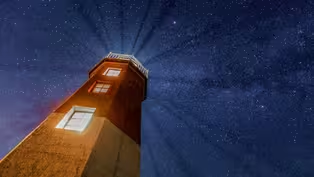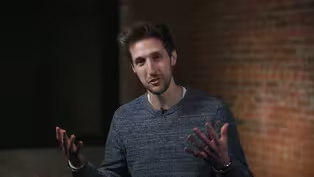
Wonders on the Waves
Clip: Season 5 Episode 32 | 9m 31sVideo has Closed Captions
Surfers performing miracles with neurodivergent and non-ambulatory teens.
In Little Compton, some say a group of surfers are performing miracles with neurodivergent and non-ambulatory teens. Gnome Surf turns those with Down syndrome, autism, depression, or anxiety into water athletes.
Problems playing video? | Closed Captioning Feedback
Problems playing video? | Closed Captioning Feedback
Rhode Island PBS Weekly is a local public television program presented by Rhode Island PBS

Wonders on the Waves
Clip: Season 5 Episode 32 | 9m 31sVideo has Closed Captions
In Little Compton, some say a group of surfers are performing miracles with neurodivergent and non-ambulatory teens. Gnome Surf turns those with Down syndrome, autism, depression, or anxiety into water athletes.
Problems playing video? | Closed Captioning Feedback
How to Watch Rhode Island PBS Weekly
Rhode Island PBS Weekly is available to stream on pbs.org and the free PBS App, available on iPhone, Apple TV, Android TV, Android smartphones, Amazon Fire TV, Amazon Fire Tablet, Roku, Samsung Smart TV, and Vizio.
Providing Support for PBS.org
Learn Moreabout PBS online sponsorship(waves swishing) - [Surf Instructor] Go, Gabby.
(waves swishing) - At Gnome Surf, we surf with over 3,000 athletes and families.
What we do is surf therapy.
Our athletes at Gnome Surf are typically neurodivergent.
We're for all kids, we've built our program on inclusion, but I'd say over 95% of our athletes either have autism, Down syndrome, ADHD, depression, or anxiety.
(waves swishing) My name is Christopher Antao, I am the executive director and founder of Gnome Surf.
(waves swishing) - My name's Mackenzie Palumbo, and I'm Cash and Hollis's mom.
Cash and Hollis are 13 years old, they're twin boys.
They were diagnosed at 15 months of age with autism and a handful of other diagnoses.
Both of my boys are pretty much nonverbal.
Hollis is nonverbal, Cash has some language.
These are kids that typically do not get invited to birthday parties or sleepovers.
To see them having fun, doing something that typical kiddos do, it's a feeling like no other.
Every time I stand on that shore and I watch my kids out on the board, I always think to myself, "This is what parents of typically developing children must feel like, when they watch their kids play baseball, or football, or soccer," and you just feel so proud.
(waves swishing) - My name's Geo Mattram.
I'm the lead instructor here at Gnome Surf.
So I was born brain damaged, It's led to, like, brain aneurysms, scattered bleeding spots.
It's led to a whole host of different challenges for me.
The most prominent has been sensory regulatory, and then social situations.
Couldn't speak till I was, like, six, and then it's been a long journey to this point of verbalization.
I've also had seizures, general motor skill challenges, so to say, Luckily, Gnome has helped me recover from that, amazingly, because when you have a lot of this stuff, you have super-low self-esteem, super-low confidence.
It's helped my balance, my social skills, and has overall turned me into a more well-rounded human and athlete, I would say.
I started surfing with Chris seven years ago, and I started teaching three to four years ago.
I've seen Gnome from all different angles.
I've seen what the surf therapy does, and how amazing of an impact it has, and the true healing potential and amazingness that it gives off, and I can also see it from the instructor side, and how what I do and how I can teach can then heal kids and their certain challenges.
(youngsters laughing and shouting) - I'm Heidi MacCurtain, I'm Abby's mom.
Abby wasn't meeting milestones, so eventually, around six months, her pediatrician suggested that we look at an MRI to maybe see if there's anything else going on.
On that MRI, it showed that she had lesions on her brain, and then elevated lactate, which were consistent with Leigh's, so at that point, what they knew about Leigh's disease, which is a mitochondrial disease, they said she had about two years to live.
That has since changed.
She's 11, she's been in a drug study, and we're just trying to do as much as we can to live a full life for our whole family, and Abby getting out doing stuff like surfing and horseback riding.
We try to do what we can.
Abby loves adventure and she loves water.
That's one thing, any type of water play, water activity, always brings her to life.
When we had the opportunity to try surfing, I was like, "We'll try it."
I was a little nervous of how they would support her, since she's 100% reliant on somebody to hold her up, she can't sit up on her own, she can't walk, so I just saw some videos, and I said, "Well, they seem to have a good handle on it."
And the first time I came, they're like, "Mom, don't worry, we've got it."
And I was like, "Okay."
Even just pushing her across the sand, I was like, I'm so used to doing this stuff, so to give all the control away and watch it, it was so enjoyable.
Her smile, her laughter, and everybody around her, it was awesome, and we couldn't wait to have another opportunity to do it.
- [Surf Instructor] Do you like surfing?
- Yeah.
(surf instructor laughing) - Gnome Surf has, you know, saved my life.
I've struggled with ADHD, depression, anxiety, and when I'm out there on the waves with these kids, everything slows down, it calms down for me, and I truly get my medicine, so to say, just like these kids.
It's made my life a thousand times better.
You know, I'm lucky enough to know what my purpose on earth is.
When I started, I was an executive banker, made well over six figures, a very successful, lucrative career, and Gnome Surf just kept growing and growing, and one day came where I needed to make the decision whether it was to grow the surf school for children or to continue to be an executive banker, and for me, that decision was extremely easy.
When I look out in the water and see the smiles of these children that depend on me, I knew that I only had one choice to make, so I decided to go Gnome Surf full time, and also became a firefighter in the city of Fall River, and so now I change lives and save lives (laughs).
Do I ever cry?
Yeah, absolutely, I cry.
I try to, you know, shelter the tears a little bit from the families, because I know it's pretty emotional for those parents too.
It makes me quite emotional to know that we're delivering something to this family that normally they don't have the opportunity to partake in, and to see the parents smile and to tear up, and to see their child breaking barriers, or proving, you know, the scholars wrong, is something that, you know, is truly meaningful and deep for me.
- How do you not get emotional?
How do you not get emotional when you have a child who is nonverbal and all he can do is smile from ear to ear because he's just so happy?
How do you get emotional when you have a child who's wheelchair-bound or medically fragile, and you see them out on the board?
Those are things that you just never picture for your own kid, and you see them doing something that makes them find joy, and it's, it's emotional.
- She could be feeling crabby at home, or even in the hospital, when she starts to perk up just sitting her by the sea, getting her playing with water just, I don't know, makes her happy, so I think just being out there when you're surrounded by it, she's in her element, right?
Are you a surfer girl?
Yeah.
Can you say thank you?
How may you know thank you?
Thank you.
- To date, Gnome Surf has provided surfing experiences
Video has Closed Captions
Clip: S5 Ep32 | 8m 48s | Photographer captures lighthouses at night under star-studded sky. (8m 48s)
Video has Closed Captions
Clip: S5 Ep32 | 5m 38s | Filmmaker explores Rhode Island’s abandoned buildings. (5m 38s)
Providing Support for PBS.org
Learn Moreabout PBS online sponsorshipSupport for PBS provided by:
Rhode Island PBS Weekly is a local public television program presented by Rhode Island PBS













